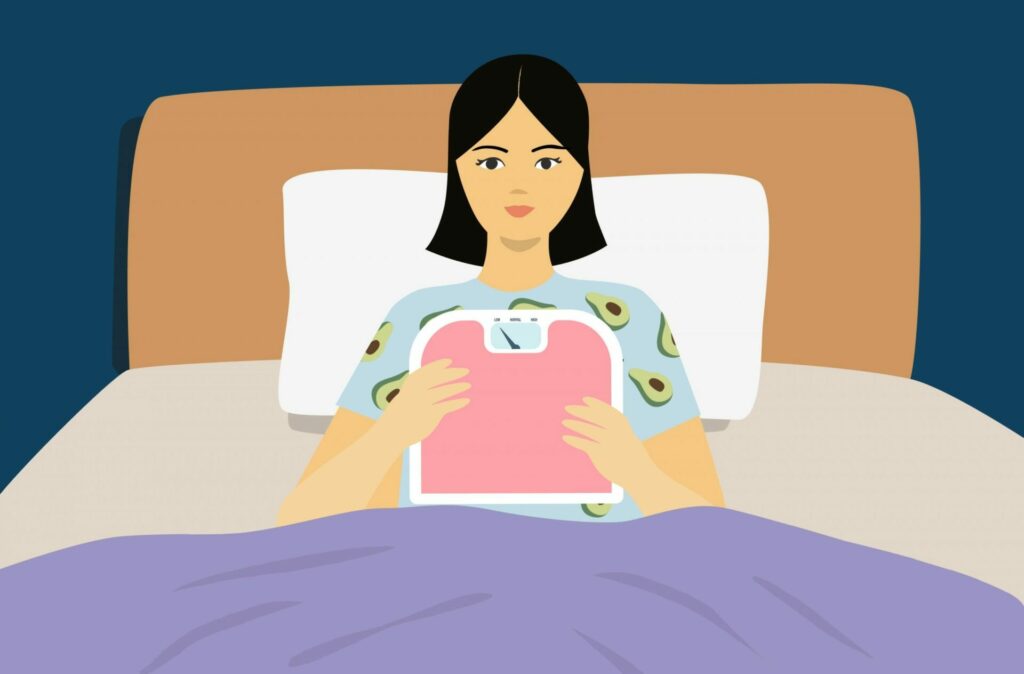Do you ever feel like you’re working hard to diet and exercise, but not seeing the results you want? You’re not alone. A lot of people struggle with weight loss, and it can be frustrating when you feel like you’re doing everything right and still don’t see results. Did you know that there is a link between sleep and weight loss? It’s true! In this blog post, we will discuss the link between sleep and weight loss, as well as ways to improve your sleep habits so that you can lose weight more easily.
How Sleep And Weight Loss Are Connected?
 Sleep is important for many aspects of our health, including weight loss. When we sleep, our bodies are able to repair cells and restore energy levels. This is important because when we are trying to lose weight, we are often expending more energy than usual. If we don’t give our bodies enough time to recover, we can end up feeling run down and less likely to stick to our weight loss goals.
Sleep is important for many aspects of our health, including weight loss. When we sleep, our bodies are able to repair cells and restore energy levels. This is important because when we are trying to lose weight, we are often expending more energy than usual. If we don’t give our bodies enough time to recover, we can end up feeling run down and less likely to stick to our weight loss goals.
There are a few different ways that sleep can impact weight loss. Some of the ways in which sleep can impact weight loss are:
Hormonal Balance
Hormonal balance is important for weight loss. Sleep helps to regulate our hormones, and when we don’t get enough sleep, our hormone levels can become unbalanced. This can lead to increased hunger and cravings, as well as decreased metabolism. When we are trying to lose weight, it is important to maintain a healthy balance of hormones in our bodies, and one way to do this is by getting enough sleep. Sleep deprivation can cause hormonal imbalances that make weight loss more difficult. Some of the hormones that are affected by sleep include:
- Cortisol: Cortisol is a stress hormone that can increase appetite and cravings. It can also lead to increased fat storage.
- Ghrelin: Ghrelin is a hormone that increases hunger. When we don’t get enough sleep, our ghrelin levels increase, which can make us more likely to eat more than we need.
- Leptin: Leptin is a hormone that helps to regulate metabolism. When we don’t get enough sleep, our leptin levels can drop, which can lead to a slower metabolism.
- Adiponectin: Adiponectin is a hormone that helps to regulate metabolism and fat storage. When we don’t get enough sleep, our adiponectin levels can drop, which can make it more difficult to lose weight.
Blood Sugar Levels
Sleep also affects our blood sugar levels. When we don’t get enough sleep, our blood sugar levels can become unbalanced. This can lead to increased hunger and cravings, as well as decreased metabolism. The blood sugar level is indicative of how much glucose is present in your blood. This means that when your blood sugar levels are unbalanced, you may crave sugary foods or simple carbs, which can lead to weight gain. Sleep is important for maintaining balanced blood sugar levels. It helps to regulate the release of insulin, which is a hormone that helps to control blood sugar levels.
Inflammation
Sleep also helps to reduce inflammation in the body. A lack of sleep can lead to increased inflammation, which can make it more difficult to lose weight. Sleep is important for reducing inflammation because it helps to repair cells and reduce stress levels. When we don’t get enough sleep, our bodies are more likely to experience inflammation, which can make weight loss more difficult. An inflammatory response is a normal immune system response to infection or injury. However, when inflammation becomes chronic, it can lead to health problems such as obesity, diabetes, and heart disease. So, it’s better to avoid inflammation by getting enough sleep.
Hunger Cues
 Most people are familiar with the feeling of hunger, but may not be as familiar with the concept of hunger cues. Hunger cues are the signals your body sends to your brain telling you that it is time to eat. These cues can be physical, like a growling stomach, or mental, like thinking about food constantly. Sleep deprivation can cause your hunger cues to become more pronounced, leading you to eat more often and making it harder to stick to a healthy diet. This is because when we don’t get enough sleep, our bodies produce more of the hormone ghrelin. Ghrelin is a hormone that increases hunger. When you’re well-rested, you’re more likely to make healthy choices and stick to your weight loss goals.
Most people are familiar with the feeling of hunger, but may not be as familiar with the concept of hunger cues. Hunger cues are the signals your body sends to your brain telling you that it is time to eat. These cues can be physical, like a growling stomach, or mental, like thinking about food constantly. Sleep deprivation can cause your hunger cues to become more pronounced, leading you to eat more often and making it harder to stick to a healthy diet. This is because when we don’t get enough sleep, our bodies produce more of the hormone ghrelin. Ghrelin is a hormone that increases hunger. When you’re well-rested, you’re more likely to make healthy choices and stick to your weight loss goals.
Eating Behaviors
Eating behaviors are the ways we eat, which can include everything from how much we eat to how often we eat. Sleep deprivation can cause changes in eating behaviors that make weight loss more difficult. For example, when we’re tired, we may be more likely to snack on unhealthy foods or overeat at meals. We may also be less likely to have the energy to cook healthy meals or to exercise. These changes in eating behaviors can make it more difficult to lose weight. You can help offset these changes by getting enough sleep and making sure to eat healthy foods. This way, you’ll be more likely to have the energy to exercise and cook healthy meals.
Mental Health
Mental health is also an important factor in weight loss. When we’re sleep deprived, we may be more likely to experience anxiety or depression. These mental health conditions can make it more difficult to lose weight. This is because they can lead to changes in eating behaviors and a decrease in motivation. Sleep is important for maintaining mental health because it helps to reduce stress levels and improve mood. If you’re struggling with anxiety or depression, make sure to get enough sleep and talk to your doctor about other ways to improve your mental health. You need to get at least seven to eight hours of sleep every night. This may seem like a lot, but it’s important for your health. If you’re struggling to get enough sleep, there are a few things you can do to help.
These are just a few of the many reasons why sleep is important for weight loss. The link between sleep and weight loss is clear. If you’re trying to lose weight, make sure to get enough sleep. This will help you to reach your goals.
How To Improve Sleep Habits
If you’re struggling to get enough sleep, there are a few things you can do to help. These tips will surely help you get the rest you need:
Create a bedtime routine
Creating a bedtime routine can help you to wind down before bed and make it easier to fall asleep. This can include things like reading or taking a bath. When you have a routine, your body knows it’s time to sleep and will be more likely to fall asleep quickly. Your bedtime routine should be relaxing and soothing so that you can drift off to sleep easily.
Stick to a sleep schedule
Stick to a sleep schedule by going to bed and waking up at the same time every day. This will help to regulate your body’s natural sleep rhythm and make it easier to fall asleep. You should also avoid napping during the day so that you don’t throw off your sleep schedule. It will help you to sleep better at night if you stick to a regular schedule.
Avoid caffeine and alcohol
You should avoid caffeine and alcohol before bed because they can interfere with sleep. Caffeine is a stimulant that can keep you awake, so it’s best to avoid it in the evening. Alcohol may make you feel sleepy, but it actually disrupts sleep and can make it harder to fall asleep. It’s best to avoid both of these substances before bed.
Limit screen time before bed
 Limit screen time before bed because the light from screens can interfere with sleep. If you must use a screen before bed, try using dim lighting and avoid looking at it for too long. You should also avoid using screens in the hour before bed so that you can wind down and prepare for sleep. It will help you to sleep better if you limit your screen time before bed.
Limit screen time before bed because the light from screens can interfere with sleep. If you must use a screen before bed, try using dim lighting and avoid looking at it for too long. You should also avoid using screens in the hour before bed so that you can wind down and prepare for sleep. It will help you to sleep better if you limit your screen time before bed.
Get up and move around during the day
Getting up and moving around during the day can help you to sleep better at night. Exercise is a great way to get your body moving and improve your sleep. You should also avoid sitting for long periods of time during the day. Taking a brisk walk or going for a swim are great ways to get your body moving. It will help you to sleep better at night if you get up and move around during the day.
Practice relaxation techniques
Practicing relaxation techniques can help you to sleep better at night. This can include things like deep breathing or progressive muscle relaxation. These techniques can help to reduce stress and make it easier to fall asleep. You should practice these techniques for a few minutes each day so that you can use them when you need them.
Declutter your bedroom
Decluttering your bedroom can help you to sleep better at night. Having a clean and organized bedroom will help you to feel more relaxed and make it easier to fall asleep. You should also make sure that your bed is comfortable so that you can sleep well. Decluttering your bedroom will help you to sleep better at night and also improve your overall sleep quality.
Invest in a comfortable mattress and pillow
 Investing in a comfortable mattress and pillow can help you to sleep better at night. A comfortable mattress will support your body and help you to sleep comfortably. A good pillow will also provide support for your head and neck so that you can sleep without pain. It’s important to invest in a comfortable mattress and pillow so that you can sleep well.
Investing in a comfortable mattress and pillow can help you to sleep better at night. A comfortable mattress will support your body and help you to sleep comfortably. A good pillow will also provide support for your head and neck so that you can sleep without pain. It’s important to invest in a comfortable mattress and pillow so that you can sleep well.
Use these tips to help you get the rest you need. Getting enough sleep is essential for your health and well-being, so make sure you prioritize it. If you have trouble sleeping, don’t hesitate to reach out to a doctor or sleep specialist. They can help you to identify the cause of your sleep problems and find a solution.
Conclusion
So, there you have it. The surprising link between sleep and weight loss. Now that you know the connection, be sure to get plenty of rest every night and watch the pounds melt away. Sleep is crucial for our overall health and wellness, and as it turns out, it may also be the key to successful weight loss. It may seem counterintuitive, but getting enough rest is actually one of the best things you can do for your waistline. So next time you’re feeling tempted to skip out on a few hours of sleep, remember that it could be sabotaging your weight loss efforts.
If you’re looking for more tips on weight loss, be sure to check out Mantra Care. From diet and exercise tips to healthy recipes, we have everything you need to help you on your journey to a healthier you. We have a team of well-experienced dieticians who will guide you throughout your weight loss journey by developing a healthy weight loss program that is tailored to your specific needs and goals. You can also get in touch with their nutrition experts through their online nutrition counseling, who can guide you through the process and help you achieve your fitness goals.


